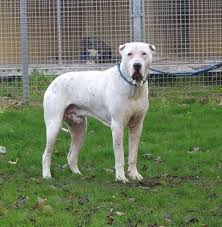
Bully Kutta
Conditions of detention
Bully Kuttas are best suited for homes with ample space, such as large yards or rural settings. They require plenty of room to move around and exercise.
Useful Fact: Due to their size and energy levels, Bully Kuttas are not well-suited for apartment living and thrive in environments where they have space to roam.
Nutrition and diet
Bully Kuttas need a balanced diet rich in protein and fats to support their muscular build. High-quality commercial dog food or a well-planned raw diet can meet their nutritional needs.
Useful Fact: Feeding them twice a day instead of one large meal can help prevent bloat, a common issue in large breeds.
Health
Bully Kuttas are generally robust and healthy but can be prone to hip dysplasia, heart issues, and skin infections. Regular veterinary check-ups are essential.
Useful Fact: Ensuring they have a balanced diet and regular exercise can help prevent many common health problems.
Grooming and care
The Bully Kutta has a short, dense coat that requires minimal grooming. Regular brushing will help keep their coat healthy and free of loose hair.
Useful Fact: Due to their short coat, they are more susceptible to extreme weather conditions and may need additional protection during very hot or cold weather.
Education and training
Bully Kuttas are intelligent and strong-willed, requiring firm and consistent training from an early age. Positive reinforcement methods work best.
Useful Fact: Early socialization and obedience training are crucial to prevent aggressive behavior and ensure they become well-mannered adults.
Toys and entertainment
Bully Kuttas enjoy toys that provide mental stimulation and physical activity. Durable chew toys and interactive toys are ideal.
Useful Fact: Given their powerful jaws, selecting tough, long-lasting toys can prevent them from quickly destroying their toys.
Safety
Bully Kuttas should be supervised around children and other animals due to their size and strength. Secure fencing and leashes are essential for their safety.
Useful Fact: Proper training and socialization can help mitigate any aggressive tendencies and ensure they interact safely with others.
Accessories
Essential accessories for Bully Kuttas include strong collars and leashes, a comfortable bed, food and water bowls, and grooming tools.
Useful Fact: Using a harness can provide better control during walks and reduce strain on their necks.
Socialization
Early and ongoing socialization with various people, animals, and environments is vital for Bully Kuttas. This helps them become well-adjusted and confident.
Useful Fact: Socialization helps prevent aggression and ensures they are comfortable in different situations and around different people.
Travel and Transportation
Bully Kuttas can travel well if accustomed to it from a young age. Secure them in a crate or with a dog seatbelt for car travel to ensure safety.
Useful Fact: Planning for their size and needs during travel is important, including providing adequate space and comfort.
Behavior and psychology
Bully Kuttas are known for their loyal, protective, and courageous nature. They form strong bonds with their families and can be very affectionate.
Useful Fact: Understanding their protective instincts and providing proper training can help manage their natural guarding behavior.
Legal aspects
In some regions, there may be breed-specific legislation affecting Bully Kuttas. It’s important to be aware of local laws and regulations regarding their ownership.
Useful Fact: Compliance with local breed-specific laws ensures that Bully Kutta owners avoid legal issues and maintain responsible ownership.


